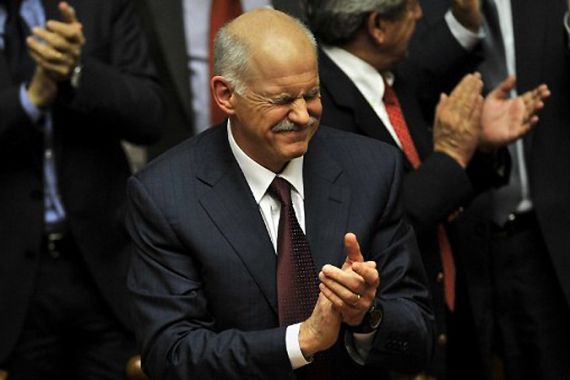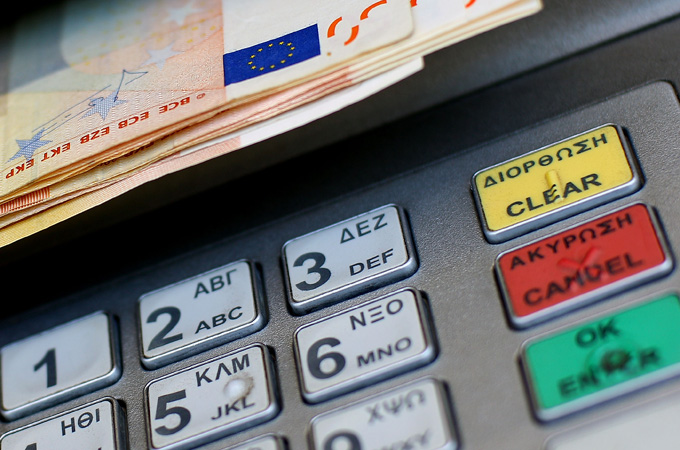Greek PM survives confidence vote
George Papandreou to hold power-sharing talks with opposition after ruling Socialist party wins vote 153 to 145.

| http://www.youtube.com/watch?v=3HqkV_EktoA |
| Al Jazeera’s Barnaby Philips says Greece is now likely to ratify sweeping budget cuts demanded by IMF and EU |
George Papandreou, Greece’s prime minister, has survived a confidence vote, calming a revolt in his ruling Socialist party with an emotional pledge to step aside if need be and seek a cross-party government lasting four months to safeguard Europe’s new debt agreement.
Papandreou won the critical confidence motion with a vote of 153-145 in the 300-member parliament early on Saturday after a week of drama in Athens that horrified its European partners, spooked global markets and overshadowed the Group of 20 summit in the French resort of Cannes.
The threat of a Greek default or exit from the common euro currency has worsened the continent’s debt crisis, which is already struggling under bailouts for Greece, Ireland and Portugal.
|
“The priority is the security of the country, continued [rescue] funding, adhering to the debt deal and our continued presence in the euro, and all other initiatives need to avoid danger for the nation“ – George Papandreou, Greek PM |
Evangelos Venizelos, the Greek finance minister, said the new government that will be formed would last until the end of February.
But opposition leader Antonis Samaras, who had demanded Papandreou resign and a new government be formed that did not include members of any political party, called for snap elections. He did not say whether his conservative party would join coalition talks, due to be formally launched later on Saturday when Papandreou meets the country’s president.
“The masks have fallen; Mr Papandreou has rejected our proposals in their entirety. The responsibility he bears is huge. The only solution is elections.”
Papandreou’s government came under threat this week, much of it internal, following his disastrous bid to hold a referendum on a $180bn European bailout agreement.
Al Jazeera’s Barnaby Phillips, reporting from Athens, says the rebels within his party fell back into line – given the undertaking – that he would stand down.
“Although he didn’t say that, many people feel that George Papandreou will step down, because he said he was “not wedded to the position of prime minister” and would not necessarily head the new government of national unity.
“This remains a big area of conjecture and uncertainty.”
‘Governed without turbulence’
Our correspondent says the other area of concern is the fate of the official opposition. “The New Democracy party insists that an early election was the only solution for Greece.
“So by implication of the vote – the main opposition party would be left outside of this new national unity government – as they all voted against Papandreou in today’s vote, it begs the question of: How valid is this new government?
“It is a moot point and will trouble people as there is potential for more political uncertainty and a lack of consensus that will have repercussions that will be felt way beyond this small country.
“Which is precisely why we are paying so much attention to tonight’s vote,” our correspondent said
Papandreou told parliament before the vote that he would go to the Greek president on Saturday to discuss formation of a broader-based government that would secure the euro zone bailout, Greece’s last financial lifeline, adding that he was willing to discuss who would head a new administration.
| In Depth | |||||||||
|
He warned that calls for early elections would be “catastrophic” and said Greece must implement the bailout plan to avoid re-defaulting on its debts.
“We, the Socialist party deputies, carried the cross of reform … But one group in parliament is not enough. This great task requires sincere and broad support,” Papandreou said, stressing the transition must be as smooth as possible.
“The priority is the security of the country, continued [rescue] funding, adhering to the debt deal and our continued presence in the euro, and all other initiatives need to avoid danger for the nation.”
Papandreou said his main interest was to stabilise the country’s economy, and he was open to negotiation as to who would lead the new government.
“We must proceed in an organised way. And regardless of developments, the country must be governed tomorrow without turbulence,” he said.
He was forced to withdraw the referendum plan on Thursday after markets and European Union leaders reacted with hostility to the idea, and his legislators and ministers rebelled and called for him to step down, accusing him of endangering the country’s bailout.
The threat of a Greek default or exit from the common euro currency has worsened the continent’s debt crisis, which is already struggling under bailouts for Greece, Ireland and Portugal.
Protesters opposed to the government’s austerity cuts gathered outside the parliament in Athens ahead of the vote.
“Some 3,000 demonstrators have come into Syntagma Square, or Constitution Square, and they are outside the parliament building which is protected by riot police. They are chanting ‘thieves! Thieves!’ against the members of parliament,” Al Jazeera’s Barnaby Phillips reported on Friday.
Through waves of austerity policies demanded by the nation’s international lenders, Papandreou has carried the parliamentary group of his party with him, despite much criticism within the ranks, but defections have left him needing every vote to survive.
